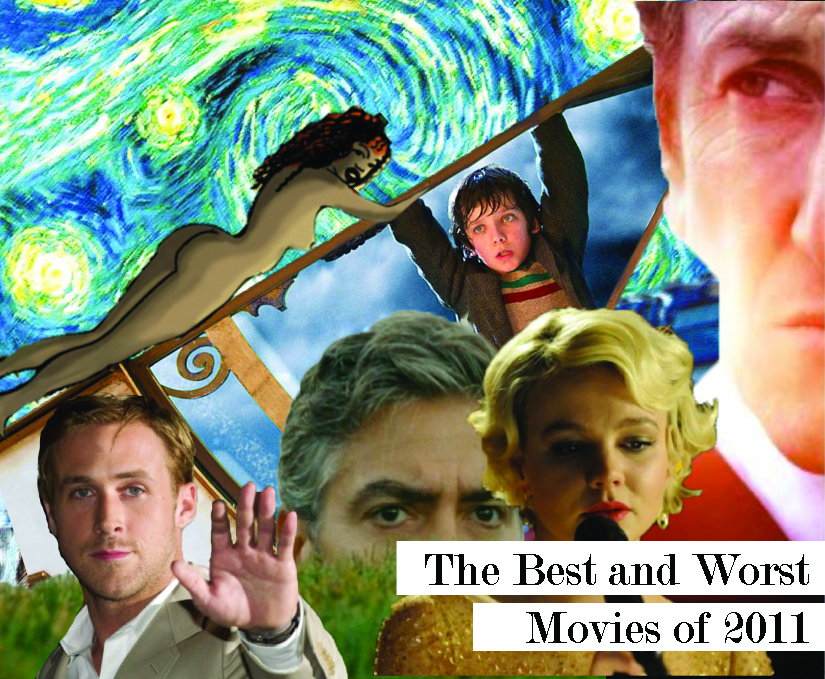Making lists of the best movies of the year is never easy, mainly because no matter what you choose, there will always be a film that’s overlooked, and people who completely disagree with you. This list represents my favorite films of the year — nothing more, nothing less.
5. Chico and Rita: Though it was released to the rest of the world one year ago, it came to America this year and was
nominated for the Oscar for Best Animated Film — and it should win. It’s a story that’s been told many times, but never in the way with which this team has done it. Set in 1948 Cuba, this film is about two individuals trying to balance two battling forces: their love for each other and their love for art. The filmmakers take you on a journey around the world in space, time and music. A stellar
original piece of filmmaking, Chico & Rita is a landmark in the overlooked genre of adult animation.
4. The Tree of Life: I saw this film in the theaters, and many people in my audience did not know what to make of it, but those of us that did knew that we were watching something special, the kind of movie like 2001: A Space Odyssey that only comes around every twenty-five years or so, that takes the traditional film narrative and gives it a new meaning beyond anything we have seen before. While it has received its fair share of praise from critics and Hollywood insiders alike, The Tree of Life has struggled with mainstream audiences: some claim to find this movie boring, self-indulgent, lacking narrative focus (some theaters had to put up signs warning people that there wasn’t a narrative and there would be no refunds allowed because so many had walked out on it, giving up). Honestly, I don’t know how they could hang that sign up to begin with. There is a clear beginning, middle and end that is occasionally interrupted by beautiful sequences which feature conceptions of genesis and the after-life and brilliantly creative visual effects that add to the emotional arc of the story and make this film stand out. In addition to stellar direction from Malick, who uses the film language to communicate his message like no other, what also makes this movie special are 1) Emmanuel
Lubezki’s cinematography and 2) Brad Pitt’s performance as Jack, the unhappy, grueling, antagonist father. Scorsese once said about Kubrick, “it takes Kubrick ten years to make a film, but one of his films is equivalent to ten of someone else’s.” Such is the case with Terrence Malick, whose film The Tree of Life is a masterpiece.
3. Moneyball: When Brad Pitt went on Charlie Rose this past year promoting Moneyball, he said specifically, “I like the kinds of movies from the 70s where the guy you’re watching doesn’t necessarily change, but the world around him does.” These kinds of characters, the kind like Billy Beane, who inward, lonely, driven, calculated but caring, are a key component of what made the American New Wave the American New Wave. With Moneyball, both Brad Pitt and Jonah Hill procure career highs in their performances, and the script written by top-draw writers Steve Zaillian and Aaron Sorkin pops off the screen with incendiary wit combining both elements of comedy and tragedy about America’s favorite pastime.
2. Hugo: My dad’s accused me of being a Scorsese suck-up. I have loved almost every Scorsese film I have ever seen, and yes, Raging Bull, Goodfellas and Taxi Driver are all in my top ten of all time favorites. Regardless, but I walked into Hugo with low expectations. A kids’ movie? In a train station? In 3-D? I had my doubts but was completely surprised and walked out of that theater feeling incredible. This film’s use of 3-D technology and state-of-the-art visual effects mixed with incredible cinematography to tell a story that is as immersive as a Dickensian adventure with the back-drop of it being the death of silent film and the importance of film preservation. Hugo is one of Scorsese’s best, and it shows both his comprehensive range as a popular artist and his genuine love for the cinema.
1. Shame: On the surface, Shame seems like it’s a film about a sex addict, but it’s really a film about a lost man looking for connection. With Shame as his sophomore film effort, British artist-turned-director Steve McQueen shows an eye for detail that evokes Kubrickian direction, with sweeping long takes that evoke a feel of the French New Wave and an ability to let the film breathe. Michael
Fassbender immerses himself in this role so deeply, and McQueen frames his character Brandon in a way that makes him beautiful yet ugly (which with Fassbender is hard to do), successful yet unhappy, vulnerable yet trapped in his own mind and detached from the world around him. Brandon’s own ways prevent him from being intimate and incite his disturbing spiral. Even though it’s my
favorite movie of the year, I don’t know that I could see it more than twice.










